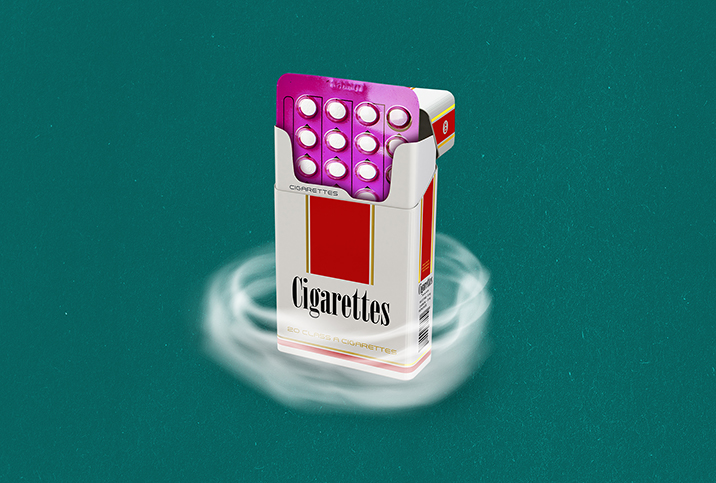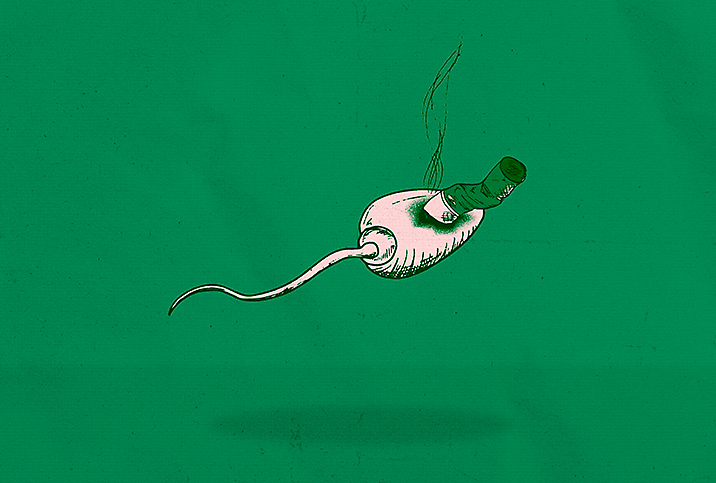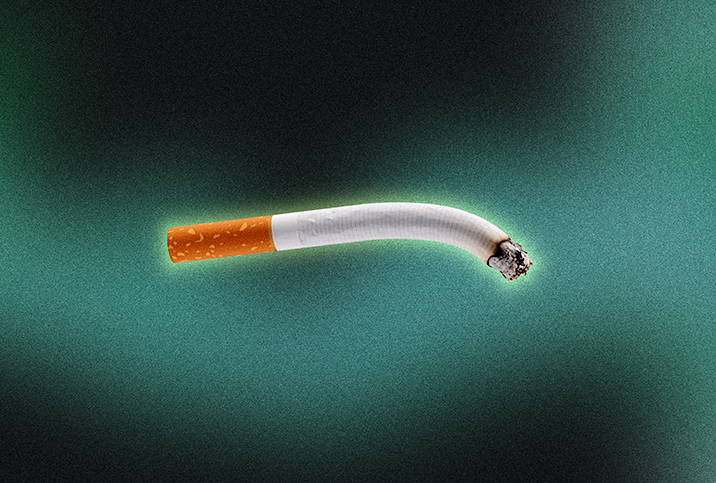Nicotine and Sex: What Are the Affects?

When you smoke, nicotine reaches your brain in seconds and changes it. But as long as you keep smoking on a regular basis, withdrawal symptoms are reduced. However, this creates a cycle that reinforces the habit and an addiction, giving you instant pleasure and an unfortunate dependency.
This is just one indication of the real harm smoking may have on your body. Another is the relationship between nicotine and sex.
Ever since tobacco entered the mainstream in the early 19th century, there have been detractors. Though it wasn't until 1950 that research linked cigarette smoking to cancer. By then, almost half of American adults—45 percent—smoked.
Movie stars such as Gary Cooper, Marlene Dietrich and Humphrey Bogart glamorized smoking, and the cigarette was a popular prop in Hollywood pictures.
The smoke around these celebrities was associated with sexiness to audiences worldwide. The attractiveness of smoking, coupled with a suggestive advertising strategy, screamed sex.
The reality is your sexual health can be harmed by nicotine, and your performance in the bedroom may be severely impacted.
"The more you smoke, the more your chances for sexual dysfunctions such as low sexual desire can occur," said Jasmine Richardson, L.P.C., a Philadelphia-based individual, relationship and sex therapy specialist with Healthy Mindset PA.
How nicotine affects your sexual health
"Some ways nicotine affects individuals' sexual health is that it can cause vaginal dryness in some and erectile dysfunctions in others," Richardson said.
Nicotine affects your circulation by causing blood vessels to constrict. Circulation is essential for achieving erections, increasing pleasure and reaching orgasm. Likewise, nicotine can alter the hormonal balance necessary for sexual desire.
If you smoke, you could have reproductive problems in addition to sexual dysfunction. According to the American Society for Reproductive Medicine, smokers have twice the rate of infertility of nonsmokers, due to impaired ovarian production, early menopause, sperm DNA damage and decreased semen volume, among other factors.
Nicotine and physical performance issues
If you're feeling short of breath during sex, it's probably nicotine.
Smoking can negatively affect your aerobic and anaerobic fitness, according to a study published in February 2021 in the journal Healthcare (Basel).
Nicotine affects your overall health, too. These effects include aspects that can impair your physical endurance, such as your lung and cardiovascular capacity. Diminished capacity prevents you from breathing properly during physical activity. And that counts for both exercise and intercourse.
"Smoking can lead to chronic inflammation of the lung," said Garen S. Wolff, M.D., an allergist-immunologist and the chief physician of Wolff Allergy & Asthma in Detroit. "When lungs are inflamed, they can't expand and deflate properly, leading to shortness of breath."
This inability to breathe gets worse during physical activity, obviously, because that's when our bodies are most in need of oxygen.
Chronic exposure to acrolein, one of the most toxic components of cigarette smoke, has been linked to lung injury, development of asthma, respiratory cancers and chronic obstructive pulmonary disease (COPD), according to a 2023 study published in the journal Cells.
Other problems for your health
You don't have to be a smoker to ingest nicotine. It's in chewing tobacco, cigars and e-cigarettes. The one thing they all have in common with cigarettes is they're harmful to your body.
"As an allergist-immunologist, I treat patients with diseases that range from asthma, allergic rhinitis, eczema and hives to recurrent infections," Wolff said. "Smoking negatively impacts my asthma patients by causing constant irritation that results in asthma exacerbations and reduces the lungs' ability to fight infections."
Your respiratory health is not the only system compromised. Hundreds of toxic chemicals can affect you when you smoke. According to the American Heart Association (AHA), smoking increases your risk of heart disease and stroke and cancers of the lung, throat, cervix, bladder, pancreas, mouth and kidneys.
About one-third of deaths from coronary heart disease are caused by nicotine, according to the AHA, and about 90 percent of lung cancer cases in the United States are linked to tobacco.
"I encourage individuals that want to quit by letting them know it will have a healthy impact on the physical health as well as their sex life," Richardson said.
Vaping, the new way to ingest nicotine
Research has linked vaping to various health problems in recent years, including a 2023 study by the AHA that associated vaping with an increased likelihood of depression and anxiety.
"Vaping is definitely not harmless," Wolff said. "Nicotine, the main ingredient of e-cigarettes, has been proven to be toxic for the lungs, leading to diseases such as chronic obstructive pulmonary disease and lung cancer."
Vaping can cause DNA damage in the oral cells of frequent vapers, according to a 2023 study from the Keck School of Medicine of USC. The researchers reported the highest levels of damage in vapers who used pods and ones who chose sweet flavors.
"E-cigarettes not only contain nicotine but also low levels of chemicals like formaldehyde that are toxic for the lungs, and others like benzene or lead that can inflame the respiratory tract," Wolff said.
Smoking in the bedroom
It may be a cliché, but many smokers crave nicotine after sex.
Health implications could be a consequence for your partner, even if they don't smoke.
"Many individuals I work with—who are the only one that smokes in the relationship—state that their partner prefers they smoke outside," Richardson said. "This can look like spending some time in the bed after sex and then going outside to have that needed smoke and then resume spending time with their partner."
Secondhand smoking
Smoking is prohibited in enclosed public places, some people do it in their home or when socializing with friends. When they do, the nicotine affects them and people who are nearby.
Secondhand smokers may be at risk for respiratory illnesses and other health problems from frequent exposure.
"Secondhand smoke can be just as harmful as smoking," Wolff said. "Tobacco smoke irritates the airways, which causes the lungs to produce more mucus. It also weakens the ability of mucus and other irritants to be cleared out of the airways."
People close to vapers can experience problems, too. Secondhand exposure to nicotine through vaping is associated with shortness of breath and increased risk of bronchial symptoms, according to a 2022 study published in Thorax.
"For children, this is particularly important because their lungs and airway are still developing," Wolff added.
"I advise speaking with your doctor about smoking cessation programs offered," Richardson said. "Smoking can be difficult to quit on your own—and individuals may need to use over-the-counter products if speaking with a healthcare professional is not an option."


















